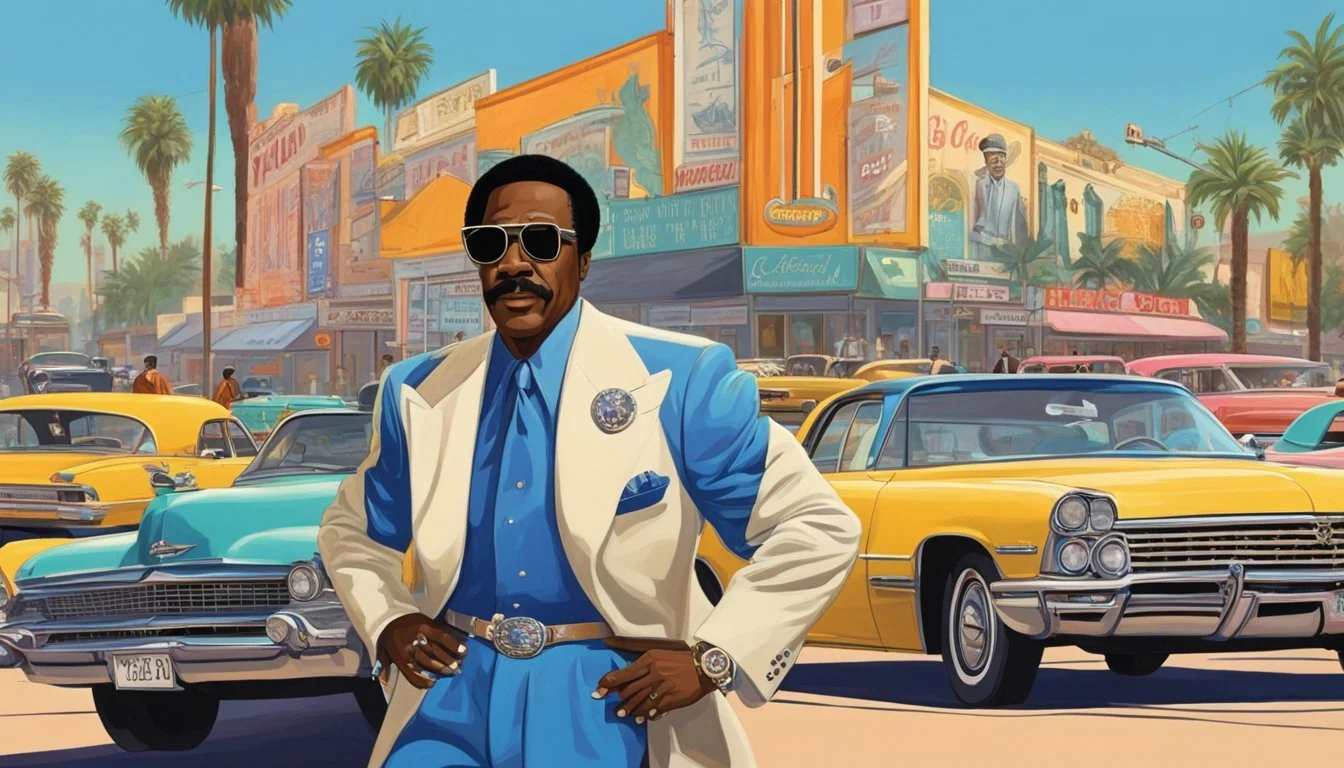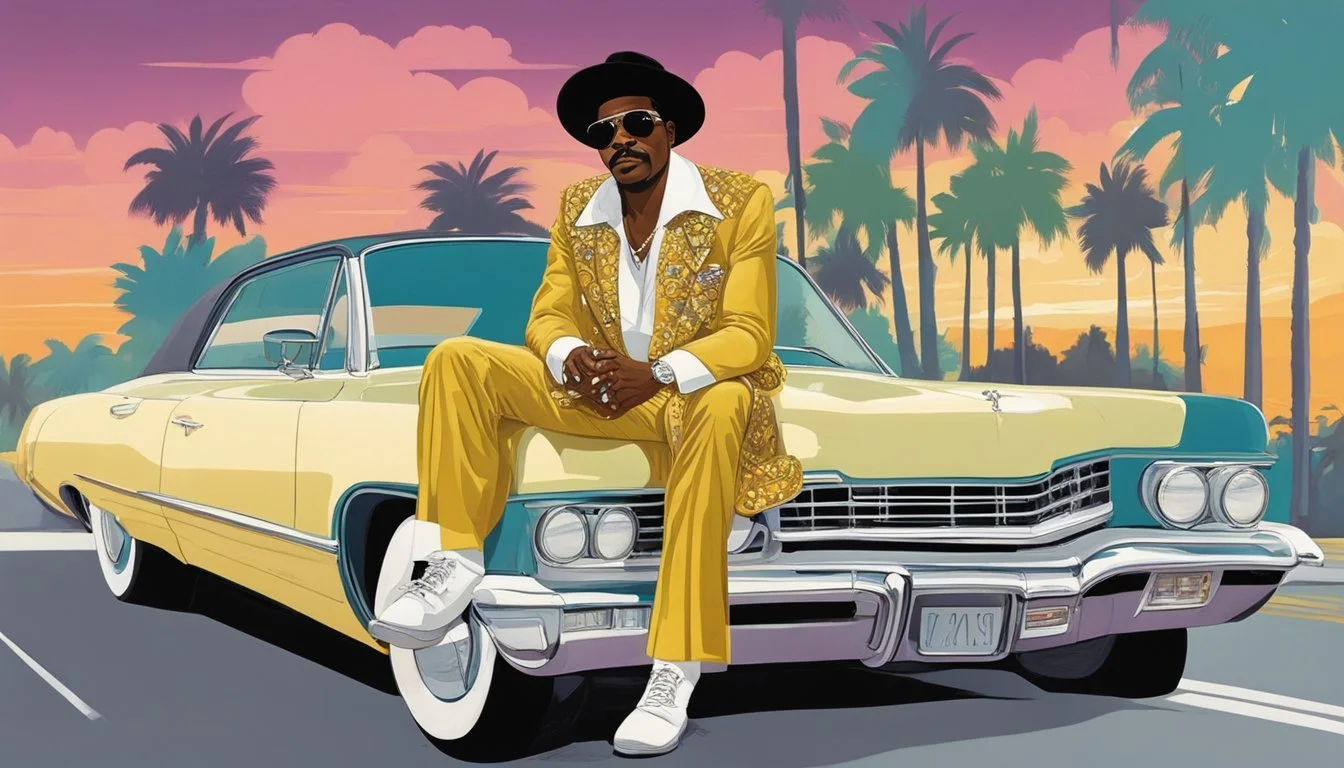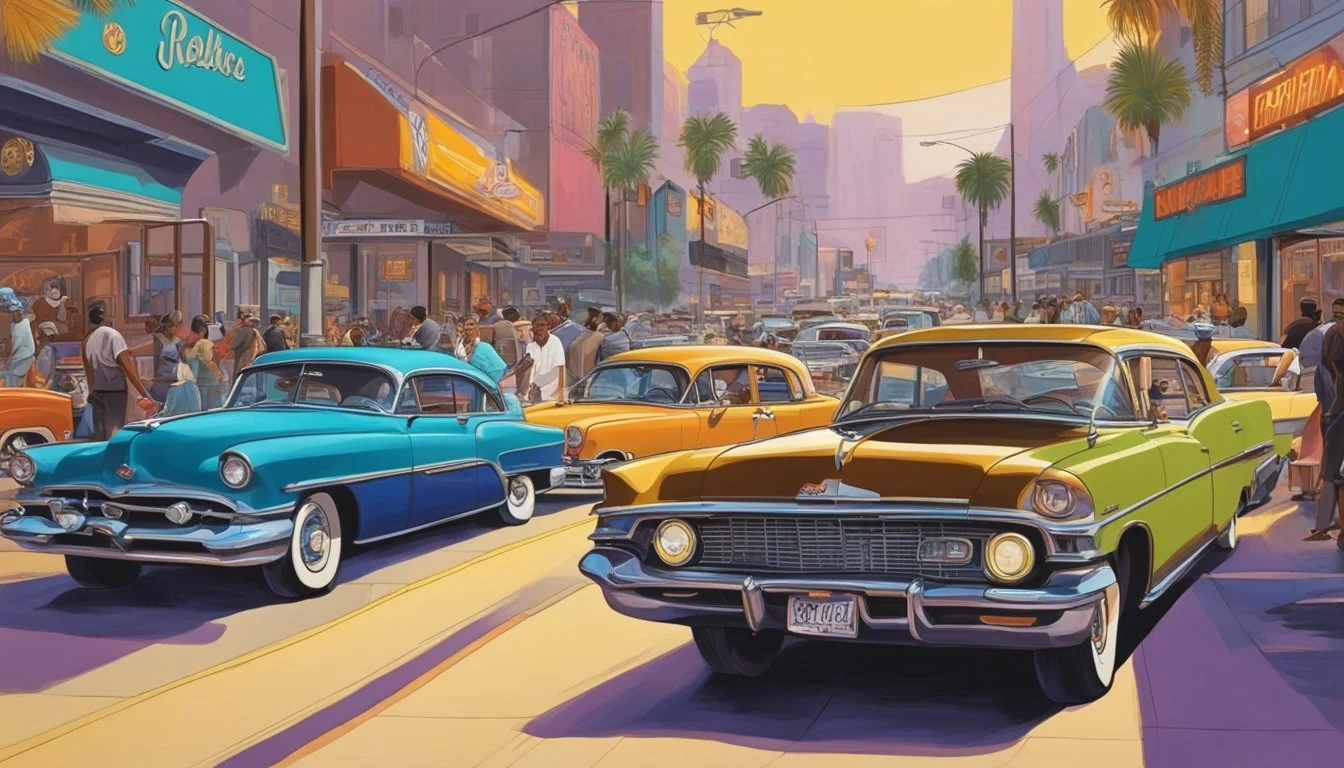The Man Behind Dolemite: Rudy Ray Moore's Real Hollywood Hustle
From Obscurity to Blaxploitation Icon
Rudy Ray Moore was a trailblazing comedian and entertainer who left an indelible mark on American popular culture. In the 1970s, he created the iconic character of Dolemite, a foul-mouthed pimp with a knack for rhyming and martial arts. Moore's journey from struggling performer to cult film star exemplifies the true spirit of Hollywood hustle.
Moore's path to success was unconventional and fraught with challenges. He financed his first Dolemite film in 1975 using profits from his stand-up comedy records, risking everything on a dream. His unique blend of raunchy humor and street-smart persona resonated with audiences, particularly in the African American community.
The story of Rudy Ray Moore's rise to fame has recently gained renewed attention through the Netflix biopic "Dolemite Is My Name," starring Eddie Murphy. This film sheds light on Moore's determination and creative genius, showcasing how he transformed himself from a record store clerk into a cultural icon. Moore's legacy as the "Godfather of Rap" and his influence on comedy and film continue to inspire new generations of performers.
Early Life and Career Beginnings
Rudy Ray Moore's journey from humble beginnings to entertainment icon was shaped by his roots in Arkansas, time in Ohio, military service, and early forays into show business.
Fort Smith Roots and Ohio Journeys
Rudolph Frank Moore was born on March 17, 1927, in Fort Smith, Arkansas. He grew up in a poor family during the Great Depression. As a child, Moore showed an early interest in performance, often entertaining his classmates.
In his teens, Moore moved to Cleveland, Ohio. This relocation exposed him to a wider range of cultural influences and entertainment opportunities. He began honing his skills as a singer and dancer in local clubs.
Moore's time in Ohio was crucial for developing his artistic voice and building connections in the entertainment world.
Military Service and Early Entertainment Ventures
Moore joined the U.S. Army in the late 1940s, serving in an entertainment unit. This experience allowed him to refine his performance skills and exposed him to diverse audiences.
After his discharge, Moore pursued a career in entertainment. He worked as a turntable talker at record stores, developing his comedic timing and audience rapport. Moore also tried his hand at singing, releasing R&B singles in the 1950s.
These early ventures, while not immediately successful, laid the foundation for his later comedy career. Moore's persistence and willingness to try different avenues in the entertainment industry would prove crucial in his eventual rise to fame.
Rise of a Comedy Icon
Rudy Ray Moore's journey to comedy stardom began with humble roots and unconventional inspiration. His unique style and persistent hustle propelled him from obscurity to cult fame.
Breaking into the Stand-Up Scene
Moore's comedy career started in the 1960s at small clubs in Los Angeles. He developed a raunchy, rhyming style of humor that resonated with audiences. His act incorporated elements of the dozens, a game of verbal insults popular in African American communities.
Moore's material was too explicit for mainstream venues. This led him to perform at underground clubs and release uncensored comedy albums. These "party records" gained popularity through word-of-mouth promotion.
Dolphin's of Hollywood: The Launchpad for Success
Dolphin's of Hollywood, a record store on Central Avenue, played a crucial role in Moore's rise. The store allowed him to sell his albums directly to customers. This direct distribution method helped Moore bypass traditional channels and build a loyal fanbase.
The success of his albums at Dolphin's caught the attention of Kent Records. They signed Moore and released his breakout album "Eat Out More Often" in 1970. This wider distribution expanded his audience significantly.
The Birth of the Dolemite Character
Moore's most famous creation, Dolemite, emerged from his stand-up routine. The character was inspired by stories told by a local homeless man. Dolemite was a foul-mouthed, kung-fu fighting pimp who spoke in rhyme.
The Dolemite persona became the centerpiece of Moore's act. He released several comedy albums featuring the character, including "This Pussy Belongs to Me" and "The Dirty Dozens."
Dolemite's popularity on the comedy circuit led Moore to bring the character to the big screen. This transition marked the beginning of his film career and cult status in blaxploitation cinema.
The Making of a Blaxploitation Legend
Rudy Ray Moore's journey from stand-up comedy to blaxploitation stardom exemplified his entrepreneurial spirit and creative vision. His transition to film revolutionized the genre and left an indelible mark on black cinema.
From Records to the Big Screen
Moore leveraged his success in comedy records to finance his cinematic debut. In 1975, he produced and starred in "Dolemite" with a budget of around $100,000. The film was shot in Los Angeles over a 20-day period.
Despite its low budget, "Dolemite" became an instant hit. It grossed approximately $10 million at the box office, proving Moore's instincts about his audience were spot-on.
The success of "Dolemite" catapulted Moore into the realm of blaxploitation icons. It established him as a force to be reckoned with in the indie film scene.
Dolemite's Influence on Film and Culture
"Dolemite" resonated with urban audiences through its blend of action, comedy, and social commentary. Moore's character became a symbol of empowerment for many African Americans.
The film's irreverent humor and over-the-top action sequences set it apart from other blaxploitation films of the era. It inspired future generations of filmmakers and comedians.
Moore's distinct style of rhyming dialogue in "Dolemite" is often cited as an early influence on rap music. This connection earned him the nickname "Godfather of Rap" among hip-hop artists.
Blaxploitation Milestones and the Dolemite Sequels
Following "Dolemite's" success, Moore capitalized on his newfound fame with several sequels. "The Human Tornado" (1976) continued Dolemite's adventures with an increased budget and wider distribution.
Moore's films consistently pushed boundaries in terms of content and style. They often featured outrageous plots, kung-fu action, and Moore's signature brand of humor.
"Petey Wheatstraw" (1977) saw Moore branching out beyond the Dolemite character. It incorporated supernatural elements while maintaining the blaxploitation aesthetic.
These sequels helped solidify Moore's status as a blaxploitation legend. They expanded his fan base and cemented Dolemite's place in pop culture history.
The Godfather of Rap and Cultural Impact
Rudy Ray Moore's unique style and contributions earned him the title "Godfather of Rap." His impact reached far beyond comedy, influencing hip-hop culture and reshaping entertainment standards.
Influence on Hip Hop and Modern Artists
Rudy Ray Moore's rhythmic, rhyming delivery style laid the groundwork for rap music. His albums featured proto-rap elements, blending spoken word with musical backing. This approach inspired early hip-hop artists and continues to resonate with modern performers.
2 Live Crew sampled Moore's work, bringing his influence to a new generation. Big Daddy Kane and Snoop Dogg have cited Moore as a significant inspiration. His legacy lives on through these artists and others who recognize his pioneering contributions to the genre.
Moore's characters, particularly Dolemite, became cultural icons. Their bold, unapologetic nature resonated with audiences and influenced the personas adopted by many rappers.
Comedy Records and Reinvention of Standards
Moore's comedy records broke new ground in the industry. He tackled taboo subjects and used explicit language, pushing the boundaries of what was acceptable in mainstream entertainment.
His albums often mixed R&B music with comedy routines, creating a unique blend of genres. This fusion approach influenced future artists who combined music and comedy in their work.
Moore self-produced and distributed his records, demonstrating entrepreneurial spirit. This DIY ethic later became a hallmark of the hip-hop industry, with many artists following his example of independence.
His success in comedy records allowed him to finance his film projects, showing how success in one medium could lead to opportunities in another.
The Legacy of Rudy Ray Moore
Rudy Ray Moore's impact on comedy and film continues to resonate years after his passing. His unique style and entrepreneurial spirit left an indelible mark on entertainment.
Posthumous Recognition and Tributes
Moore's influence gained renewed appreciation after his death in 2008. The New York Times published a belated obituary in 2019, acknowledging his cultural significance. Comedy clubs and film festivals organized tribute screenings of his works.
Moore's albums saw reissues, introducing new audiences to his raw, unfiltered humor. Hip-hop artists sampled his routines, cementing his status as a precursor to rap. Documentaries explored his life and career, shedding light on his DIY approach to filmmaking.
Comedians cited Moore as an inspiration, praising his fearless style and ability to connect with audiences. His impact on Black cinema gained scholarly attention, with film studies courses examining his contributions to the blaxploitation genre.
Eddie Murphy and Netflix's 'Dolemite Is My Name'
The 2019 Netflix film "Dolemite Is My Name" brought Moore's story to a global audience. Eddie Murphy portrayed Moore, capturing his determination and charisma. The film earned critical acclaim and numerous award nominations.
Murphy's performance introduced Moore to younger viewers unfamiliar with his work. It highlighted Moore's resourcefulness in producing "Dolemite" with limited means. The movie showcased his impact on comedy and independent filmmaking.
"Dolemite Is My Name" sparked renewed interest in Moore's original films. Streaming platforms added his movies to their catalogs. The biopic emphasized Moore's role as a trailblazer for Black entertainers in Hollywood.
Beyond the Screen
Rudy Ray Moore's life extended far beyond his on-screen persona. He faced personal challenges and pursued diverse business ventures throughout his career.
Personal Life and Struggles
Rudy Ray Moore battled diabetes for many years. The condition impacted his health and ability to perform. Despite these challenges, he continued to work and create.
Moore was a regular churchgoer, finding solace in his faith. He often attended services when not on tour or filming.
His personal life remained largely private. Moore never married and had no children.
Entrepreneurship and Business Ventures
Moore's entrepreneurial spirit drove him to establish his own record label. He released comedy albums and music independently, maintaining control over his content.
He invested in nightclubs, seeing them as venues for upcoming talent. These clubs became testing grounds for new material and a source of income.
Moore also produced and distributed his own films. This hands-on approach allowed him to retain creative control and maximize profits.
His business acumen extended to merchandising. Moore sold Dolemite-branded products at his shows, creating additional revenue streams.






